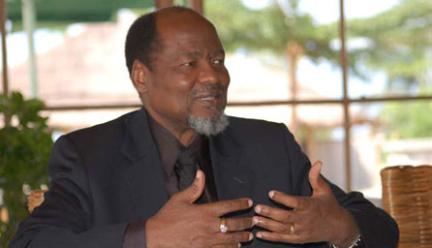About half of the world’s population resides in a country where there is one psychiatrist or less to serve 200,000 people on average, according to the World Health Organization (WHO).
However, in Malawi, there are only two psychiatrists and two psychologists who are registered with the Medical Council of Malawi and serving a country of over 13 million people.
Without access to trained mental health care professionals, the mental health issues facing Malawians remain largely untreated and access to mental health facilities with trained professionals is arduous.
“The situation for mental health in Malawi is something that really requires a lot of attention,” says Dr. Chiwoza Bandawe, one of the registered clinical psychologists in Malawi, on the topic of the 1 to 6 million psychologist to patient ratio.
Until the field of mental health started growing, Bandawe speaks of his experience being the only clinical psychologist in Malawi for about 10 years upon his return to Malawi in 1995 from studying at the University of Cape Town. He attributes the lack of psychologists in the country to the lack of attention mental health previously received.
The current state of mental health is expected to change as Bandawe adds that the Malawian government has recognized mental illness in the Essential Health Package which “will help tremendously towards putting mental health right in its necessary spotlight.”
Henry Chimbali, Spokesman for the Ministry of Health in Malawi, told The Daily Times that government is adapting to the growing needs for mental health treatment.
“Mental health is one of the priority areas that have been included in the new health sector strategic plan and requires more attention than before,” he said.
Chimbali, however, suggests mental health still requires adequate budget allocation by government. He claims an assessment made in 2008 on funding to the sector found that only 0.9 percent of the total health budget was assigned to mental health.
Faced with scarce resources and a growing need for treatment, two of the country’s main forces behind mental health, Dr. Felix Kauye and Dr. Chiwoze Bandawe both agree that tremendous challenges remain which must be overcome in the field, beginning with addressing the need for more mental health professionals.
“There are a lot of challenges which I face in my career. The main challenge which I am currently facing is the workload,” says Kauye, who is one of the country’s two registered psychiatrists and also holds the title of Director of Mental Health Services at Malawi Government.
His skills are so highly relied on that his role within Malawi is increasingly more multifaceted. Kauye undertakes clinical work at Zomba Mental hospital, where he has four business ward rounds and one academic ward round in a week. He is also a clinical lecturer for the College of Medicine and involved in the training of post graduate students who are training to be psychiatrists. Additionally, Kauye is the head of the management team of Zomba Mental Hospital and is involved in the administration of the hospital.
But his role still does not end there, “Lastly but not least, I am involved in the drafting and implementation of national mental health programs like integration of mental health in primary care in Malawi and supervision of district mental health services,” says Kauye.
Bandawe’s responsibilities are just as demanding. At the present time, Bandawe is employed by the College of Medicine as the Dean of Students. He says his challenge, like other mental health care professionals, is not being available to as many people as he would like.
“.…I hardly see clients or patients at Queen Elizabeth Hospital and the need for psychologists is growing. People are coming to realize and appreciate the need for speaking with a psychologist,” he says.
Bandawe sums up the current problem of lack of qualified staff by saying that “there is a growing recognition and appreciation, so the challenge is as that recognition and appreciation grows, so do the demands on me grow. It becomes quite taxing at times.”
He attributes this, in part, to the fact that “the government has been so caught up with infectious diseases, which are important, but mental health has never been considered a priority,” he says.
Even without the resources to conduct community based data, Kauye is aware of the causes of psychological distress, as “the proportion of people who suffer from mental illness does not differ across cultures.” These causes include genetic factors, physical illnesses like HIV, daily life events like loss of employment, giving birth and substance abuse.
Kauye explains that there is currently a severe shortage of mental health professionals in Malawi and Bwaila unit in Lilongwe is currently run by nurses with no clinician working there. This affirms the WHO research finding that nurses represent the most prevalent professional group working in the mental health sector.
The nurses at Zomba Mental Hospital were unavailable for comment, but Kauye says, “With the shortage of staff and poor district mental health services, the team works under a lot of pressure because if we do not treat and discharge our patients quickly, the hospital becomes overcrowded and difficult to manage.”
This is particularly important in the cases where there is an over reliance on the tertiary hospitals since district hospitals are in poor condition, increasing the strain on the professionals in these settings.
Bandawe suggests that there are posts in the government for psychologists, but training and filling those posts have not been a priority. He attributes that lack of response to the stigma associated with mental health, a stigma that means those who suffer from mental illness are often ostracized from society and fail to receive the care they require, according to WHO.
“When most people talk of mental health in Malawi, they usually refer to people with severe mental illness who are in most cases unkempt and disheveled,” but mental illness has many faces, Kauye says, and this is just being realized.
Both doctors suggest that this stigma be addressed through creating mental health education and awareness, which is one of the methods that will enable every individual’s right to enjoy the best attainable state of physical and mental health under Article 16 of the African Charter on Human and Peoples’ Rights.
With the Malawian government seeking solutions to mental health care issues, there is a new hope that the future of mental health in Malawi will bring about positive change and the perceptions surrounding mental health will adapt to the growing need for mental health care professionals.
BY and about M Silvestri (The writer)
Mara, who believes the media should serve as a catalyst for social change, recently completed her Bachelor of Arts in Global Studies and Communication Studies from Wilfrid Laurier University. Mara has been involved with Journalists for Human Rights prior to being hired for her position in Malawi, she was the president of the Laurier jhr student chapter for two years and always dreamed of getting involved with the organization in an overseas capacity. Mara has published numerous pieces in The Cord Weekly and Blueprint Magazine. She will be working as the Rights Media Print Intern at the Daily Times Newspaper in Blantyre, Malawi.


.jpeg&w=60&q=100&h=60)





.jpeg&w=60&q=100&h=60)




